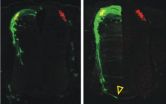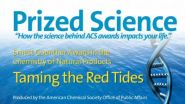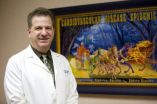(Press-News.org) Alexandria, Va. – The American Association for Dental Research (AADR) held its 3rd Fall Focused Symposium on November 12-13, in the Washington, DC, area. This year, the theme was the fast-moving field of Salivary Diagnostics, with a focus on Scientific & Clinical Frontiers. The symposium was sold-out, but AADR also offered a live Webinar broadcast of the oral sessions.
AADR created the Fall Focused Symposium under the objective to provide networking opportunities and exchange of ideas, and to offer small regional symposia focused on cutting-edge technology and techniques. At this two-day scientific program, attendees had the opportunity to view scientific posters, collaborate with colleagues and attend three panel discussions. The programming commenced on Friday morning with opening remarks and perspectives on salivary diagnostics by Lawrence Tabak, newly appointed principal deputy director of the National Institutes of Health. The symposium brought together key opinion leaders from diagnostic sciences, the dental profession, scientists from the NIH's Directors Office, NIDCR and NCI, biotechnology companies, the FDA and CMS, the ADA, the dental insurance industry, and NIH-funded investigators.
Twenty-two scientific posters were presented. Invited speakers also presented in five sessions pertaining to different areas in salivary diagnostics research, titled: "Diagnostics, Saliva and Dentistry," moderated by AADR President David T. Wong, University of California, Los Angeles; "Scientific Frontiers: Emerging Technologies," moderated by Jim Melvin, NIDCR; "A New Industry—The Innovators' Journey" and "A New Industry—The Regulatory and Payor Environment," both moderated by Jed Jacobson, Delta Dental; "Clinical Frontiers: Translational & Clinical Applications," moderated by Dan Malamud, New York University; and "Salivary Diagnostics in Dentistry, Research and Education," moderated by Dan Meyer, American Dental Association.
"AADR is delighted with the record turnout of its 3rd Fall Focused Symposium," said AADR Executive Director Christopher H. Fox. "The high caliber of research presented at the meeting contributed to its overall success. I commend AADR President David Wong for his vision for the Symposium and tireless efforts in organizing its content."
The recorded proceedings will be available through the AADR Web site (www.aadronline.org) within two weeks and the proceedings will be published in Advances in Dental Research in early 2011 in what is sure to be a landmark publication.
###
About the American Association for Dental Research
The American Association for Dental Research (AADR), headquartered in Alexandria, Va., is a nonprofit organization with nearly 4,000 members in the United States. Its mission is: (1) to advance research and increase knowledge for the improvement of oral health; (2) to support and represent the oral health research community; and (3) to facilitate the communication and application of research findings. AADR is the largest Division of the International Association for Dental Research (IADR).
To learn more about the AADR, visit www.aadronline.org. Follow AADR on Twitter at www.twitter.com/DentalResearch.
END
Both the rate and direction of axon growth in the spinal cord can be controlled, according to new research by USC College's Samantha Butler and her collaborators.
The study, "The Bone Morphogenetic Protein Roof Plate Chemorepellent Regulates the Rate of Commissural Axonal Growth," by Butler; lead researcher Keith Phan and graduate students Virginia Hazen and Michele Frendo of USC College; and Zhengping Jia of the University of Toronto, was published online in the November 17 issue of the Journal of Neuroscience.
Butler, assistant professor of biological sciences, found ...
BOSTON (11-22-10) -- Boston University researchers have developed a simple diagnostic tool that can quickly identify dangerous viruses like Ebola and Marburg. The biosensor, which is the size of a quarter and can detect viruses in a blood sample, could be used in developing nations, airports and other places where natural or man-made outbreaks could erupt.
"By enabling ultra-portable and fast detection, our technology can directly impact the course of our reaction against bio-terrorism threats and dramatically improve our capability to confine viral outbreaks," said Assistant ...
There's good news in the search for the next generation of semiconductors. Researchers with the U.S. Department of Energy's Lawrence Berkeley National Laboratory (Berkeley Lab) and the University of California (UC) Berkeley, have successfully integrated ultra-thin layers of the semiconductor indium arsenide onto a silicon substrate to create a nanoscale transistor with excellent electronic properties. A member of the III–V family of semiconductors, indium arsenide offers several advantages as an alternative to silicon including superior electron mobility and velocity, ...
RIVERSIDE, Calif. (www.ucr.edu) --A new study by University of California, Riverside scientists of what is believed to be the world's only hybrid electric tugboat found that the vessel is effective in reducing emissions at the Ports of Los Angeles and Long Beach.
Researchers at the UC Riverside College of Engineering Center for Environmental Research and Technology (CE-CERT) demonstrated the hybrid electric tugboat reduces emissions of soot by about 73 percent, oxides of nitrogen (which help cause smog) by 51 percent, and carbon dioxide, which contributes to global warming, ...
Boston, MA – A new study from the Harvard School of Public Health (HSPH) finds that high body mass index (BMI) in developing countries remains primarily a problem of the rich. The findings suggest that the shift towards overweight and obesity among the poor that has already happened in wealthier countries has not yet happened in developing countries.
The study appears in an advance online edition of the American Journal of Clinical Nutrition and will appear in an upcoming print edition.
"Previous research on the increasing overweight and obesity burden in developing countries ...
ROCHESTER, Minn. -- A new Mayo Clinic study (http://newsblog.mayoclinic.org/2008/12/03/brain-tumors-best-treatments-for-long-term-survival/) found that children with low-grade brain tumors (gliomas) (http://www.mayoclinic.org/brain-tumors/) who undergo aggressive surgery to completely remove the tumor have an increased chance of overall survival. If complete removal is not possible, adding radiation therapy to a less complete surgery provides patients with the same outcomes as a complete removal. This study was presented at the Society for NeuroOncology Annual Scientific ...
WASHINGTON, Nov. 22, 2010 — The science that helped make today's smartphones and iPods smaller but more powerful than yesterday's desktop computers highlights the latest episode in the American Chemical Society (ACS) Prized Science video series.
The new high-definition video, released today, focuses on IBM chemist Robert Miller, winner of the 2010 ACS Award for Chemistry of Materials. Miller developed materials that helped pack more transistors onto each computer chip, those postage stamp-size slivers of silicon that make up the brains of computers and other electronic ...
New findings by civil engineering researchers in the University of Minnesota's College of Science and Engineering shows that treating municipal wastewater solids at higher temperatures may be an effective tool in the fight against antibiotic-resistant bacteria.
Heating the solid waste to 130 degrees Fahrenheit (55 degrees Celsius) was particularly effective in eliminating the genes that confer antibiotic resistance. These genes are used by bacteria to become resistant to multiple antibiotics, which are then known as "superbacteria" or "superbugs."
The research paper ...
More and more people have become aware of the dangers of excessive fructose in diet. A new review on fructose in an upcoming issue of the Journal of the American Society of Nephrology (JASN) indicates just how dangerous this simple sugar may be.
Richard J. Johnson, MD and Takahiko Nakagawa, MD (Division of Renal Diseases and Hypertension, University of Colorado) provide a concise overview of recent clinical and experimental studies to understand how excessive amounts of fructose, present in added sugars, may play a role in high blood pressure, diabetes, obesity, and ...
RIVERSIDE, Calif. – Elderly adults can improve their vision with perceptual training, according to a study from the University of California, Riverside and Boston University that has implications for the health and mobility of senior citizens.
The study, "Perceptual learning, aging, and improved visual performance in early stages of visual processing," appears in the current online issue of the Journal of Vision. It was funded by a $3.5 million grant from the National Institute on Aging.
UCR researchers G. John Andersen, professor of psychology; Rui Ni, formerly a postdoctoral ...


